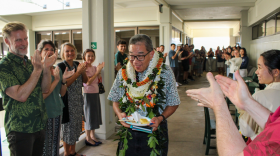Out of the more than 200 bills that were approved during the 2021 legislative session, a handful were education-related. Some lawmakers and education advocacy groups are calling the session a success, but understand the state's education system continues to be a work in progress.
Due to the impacts of the pandemic, some state lawmakers and education advocates focused primarily on preventing significant cuts to any education effort. They also narrowed their focus on measures and topics they wanted to address this session.
"Everything we wanted to get through, we were able to get through this year," said Rep. Justin Woodson, chair of the House education committee.
SB 242 was one bill that was approved by the state legislature, and is being considered by Governor David Ige. It builds off of 2018's Act 51, which promotes access to computer science courses in high schools, and expands it to include the elementary and intermediate school levels.
"In Hawaii, over the next 10 years, computer science-related jobs are gonna grow twice as fast, and pay twice as much as everything else," said David Miyashiro, executive director of the nonprofit Hawai?i Kids Can. "And yet, when we looked at what was being offered in our schools, we didn't see that recognition."
If approved it would go into effect at the start of the 2024-2025 school year.
Another measure that would help Hawai?i students is SB 224. This measure would help students get a leg-up in their careers after graduating high school by allowing them to go to a school outside of their district to attend a career and technical education program.
"We know that for certain students, applied learning is how they thrive. But we also know that these types of classes are not offered at every single high school," Woodson said.
Woodson says HB 516 expands on getting students ready for their careers by having a state board revamp and re-evaluate how students can obtain credentials in certain industries.
"We know that this is important because it will help us as a state, align marketplace needs with a formalized curriculum that is important not only business - but it's also important for our kids."
One of the bigger bills was HB 613, which allocated federal relief funds into specific categories for the department of education to use. Several categories receiving funds included a $2,200 one-time bonus for teachers and the purchase of air conditioning units with HEPA filters.
"That is a long outstanding issue," Woodson said. "In the year 2021, it's unacceptable to have classrooms that are 100? and above. And we know that the temperatures are getting hotter faster and more frequently."
But a majority of funds went toward the eventual reopening of schools. Roughly $35 million was allocated to what is known as a weighted student formula. The formula is a mechanism the department of education uses to allocate funds to specific school budgets based on the student population and demographics.
"We also added $110 million to get ready for school reopening. So this would address thing like PPE (personal protective equipment), transportation, air quality needs for classrooms that have never been air conditioned and making sure ventilation was proper," said Senator Michelle Kidani, chair of the Senate's education committee.
Kidani says around $20 million was allocated for outreach and supportive services for youth groups in underserved communities.
For Representative Woodson and the education advocacy group Hawai?i Children's Action Network, HB 1362 was a significant measure to be passed. It measure builds off early education discussions and legislation from the 2020 session. Specifically, setting a goal of having a universal early education system in a decade or less.
Nicole Woo, director of the research and economic policy at the Hawai?i Children's Action Network, says the bill gets the state moving toward expanding access to preschool education for all three- and four-year-olds within a decade.
"One of the things that it does is that it creates an early childhood educator stipend program, which is going to help develop our workforce and improve the quality of our childcare programs," said Woo.
Woodson says the stipend program would help solve a shortage in early education teachers.
"This program says it would pay for some, if not most or all, of your schooling through the University of Hawaii system, if you choose to go into one of these early childhood educator fields," he said.
Despite these victories, there were some cuts made during the legislative session. Woo says the latest version HB 200, or the state budget, contains a $7 million cut to the preschool Open Doors Program - providing subsidies for lower-income families to send their children to preschool. Another $30,000 was also cut from a fund for early learning programs at charter schools.
Efforts Going Forward
At the start of every session, a few thousand bills are introduced. A majority of those don't survive to the end of the legislative process. Among them are education-related measures.
Kidani says one bill she would have liked to see passed was SB 804. It proposed authorizing the Hawai?i Public Housing Authority and Hawai?i Housing and Finance Development Corporation to build homes for teachers - in an effort to attract and retain teachers to the state.
"This is not low-income housing. This is affordable teacher housing," she said. "This would be something new teachers could use, and the cost of the housing would be dependent on the salary."
Kidani says the bill would help alleviate the cost of living in the state for teachers which can be a deterrent for them to come or stay in the islands. She believes SB 804 didn't pass because it was shortened session, and there was a misunderstanding of what it was trying to accomplish.
"I think one of the things that the Department of Education was concerned about is that they're not in the housing business," she said.
"And we understand that, which is why we asked for the Hawai?i Public Housing Authority, because they are in the public housing building business. They have all the equipment to make sure they're collecting rents on time. So because the Hawai?i Public Housing Authority was named in there, people got the wrong impression that it was a public housing type of bill for teachers."
Kidani says she also would have liked to see financial literacy courses to be taught in schools. She says will continue to work on those efforts going into the next session.
For Woodson, he says he would like to give more funding to charter schools.
"Our charter schools are also public schools, but their per pupil allocation that they receive is less than our traditional schools," he said.
"I'm not suggesting that we take money from our traditional schools, and divert it toward our charter schools. I'm proposing, or I will be advocating for next year, taking a look at all of our means of financing, as it relates to state budgeting and applying more of that funding to the magnitude of $10 million toward our charter schools."
Woodson says he would like to continue efforts to improve Hawai?i's education system to give the best opportunities for students.




